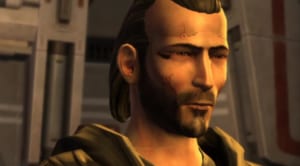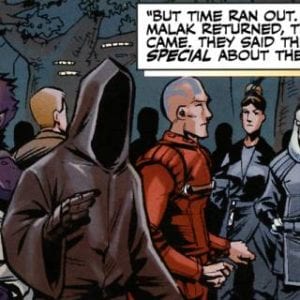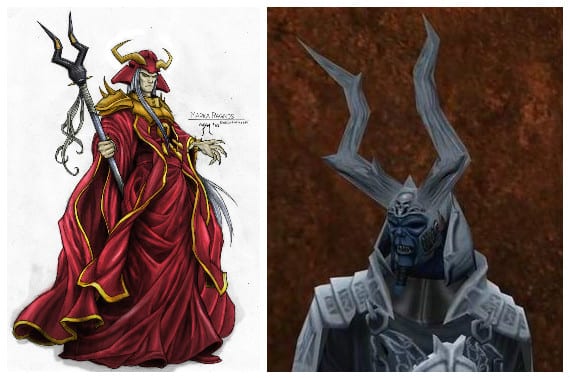You probably have noticed that my main focus in the case of Old Star Wars vs New Star Wars rivalry has, up to now, focused on ethical questions like racism and sexism. However, the main reason behind the company’s decision to reboot the franchise and retire Legends was the unresolvable canon discontinuity.
Old Star Wars canon spans 40 long years. It was created by loads of authors, artists, as well as film and cartoon directors. Loads of different creative people, and each of them had in mind their own picture of the characters and universe they worked with. Which is actually great, as it gives the universe flesh and diversity. But this only works only if all those creative people try their best not to undermine each other’s work. Which is sadly not the case with old Star Wars.
Sometimes personal desire for self-realization overcame those otherwise quite great people. John Jackson Miller, for example, was completely unabashed when he threw away the game canon and created his own versions of already loved and established characters and events. He had his reasons, certainly; but does it excuse him? Or those who followed in his steps?
Apparently, One Revan Was Not Enough

As the situation with the Knights of the Old Republic/The Old Republic franchise is one of the most blatant examples of dis-continuity(the mess that is The Clone Wars comes in a close second), let’s start with a closer look at it.
In the beginning there was a game. A good game, a very good one. It is still considered one of the pinnacles of RPG genre, despite being issued in 2003. The game was well-loved both by Star Wars fans and people completely alien to it. An expansion seemed a reasonable way to give the fans more of what they wanted.
Naturally, the fandom wanted most to know more about the game’s protagonist, Revan. Revan’s past was clouded in mystery, as the game gave numerous hints, but nothing specific. The only things we knew for sure was that there was once was a Jedi named Revan who fought Mandalorians in a great war. He committed a war crime for the sake of winning it, fell to the Dark Side, but was redeemed through erasure of whole his previous personality.
Savior, conqueror, hero, villain. You are all things, Revan… and yet you are nothing—Malak
This statement by one of the other characters was true both as we (and Revan himself) knew nothing of the real Revan, and as this character was re-done so many times one can’t say anything specific about him besides his gender (male).
There Were the Comics…
As I’ve already mentioned, John Jackson Miller didn’t hesitate to change game canon according to his own perceptions. If you read the reviews I linked earlier, you’ll see how much he changed. Still for those who didn’t, I want to outline the worst of his choices.
The game established Revan and Malak as close friends in their shared past, almost brothers. They were in many ways equals: same age, same teacher, same life. Only one of them was always a step beyond the other. This dynamic is significant both personally and thematically. It plays out on different levels: giving depth to both characters, offering the gamers a better picture of how the Dark Side ruins personalities, adding extra layer of tragedy to the whole story…
That’s why when the old canon comics had not a single scene where Revan at least talked directly to Malak, it was so devastating. Malak (oh, sorry, “Alek”) was now nothing more than one among many distant admirers of a great shrouded figure of his master, the Revanchist.

For those not acquainted with the game, imagine a comic featuring Anakin and Ahsoka depicting the duo as a Vader-esque background figure with barely ten or so lines for fifty-five installments and a distant fangirl he never talks to. Oh, and Ahsoka would devote all her time to flirting with one of the author’s original characters and trying to conquer another original character’s recognition and friendship. That would constitute her only arc in the comics. You can see what my problem with this is.
Compared to this change, the fact that author decided Revan could not possibly be the real name was almost nothing. Unlike his take on the war Revan was involved in.
I mean, the author called his movement ‘Revanchism’ and made ‘Revan’ a derivation of this new word. You see, when someone throws away his whole life to fight against genocidal and planet-destroying Space Nazis, it is not ‘revanchism’ that can possibly drive him. Yet the author decided so. Again, that ruined a part of original tragedy, where it was a ‘good war’, only war can never be truly good.
And the Game with Its Tie-Ins…
So, the comics ended, but the character (the game character, I remind you) was still beloved. Even his comics incarnation couldn’t possibly change that. The cow still had its milk, so another game was conceived: a MMO RPG this time.
Before, we at least knew something about Revan’s future. He was a hero of the Republic who went on to battle unknown evil (so that he would be comfortably absent for the duration of Knights of the Old Republic II game). The first tie-in preceding the MMO RPG itself, Revan, ruined this. In this game, Revan was conveniently frozen for 300 years so he could go insane and serve as a mid-game boss.
They also changed his previous motivation. In the first game, his descent into darkness was prompted both by war crimes/necessary evils he committed (YMMV here—it was much like the Hiroshima/Nagasaki/Dresden bombings), his unwavering pride and arrogance, and a bit of interaction with the Dark Side artifacts. In the new game? Ah, he was just mind-controlled!
I’m not even sure if the Revan contemplating and nearly performing Sith genocide was meant to be bad guy, as he does it with Jedi Council’s approval. But then he transforms and exists instead as two halves of a personality, one willing to die and rest at last, the other ready to sacrifice everyone for a chance to battle the Sith Emperor. Gladly those halves reconcile for a quiet death…or not.
Because Revan’s last appearance was of Darth Revan’s spirit, councelling The Son of Mortis. Apparently, he didn’t actually redeem himself. Or die, for that matter. Uber-evil influence, gosh.
But It’s Not Only Characters that Suffer
“[I]f you had to throw a dinner party and invite everyone who had ever stolen the Death Star plans, you’d be surprised at how many place settings you’d have to worry about.”―Pablo Hidalgo
The same book that changed Revan’s past in one aspect, changed it also in the other. Apparently, mind-control was too alluring a plot device to use only once. Though by this point, I’m less offended by another alteration of his character than another alteration of the war he fought in. Who would have thought that the Proud Warrior Race would never attack their favorite target unless their leader had been mind-controlled by the Sith!
Still, it’s hard to be really offended when rapid random retcon was a constant issue in Old Star Wars canon. So much so that they sometimes even tried to explain it away or rationalize it. Not that it worked, but at least they tried! Sometimes.
Other times they just let different versions of one event co-exist, never marking one of as ‘true’ and the others as false.
A certain human character was a Crusader of The Indomitable? Another one, a Zeltron, was there, as well? No big deal! Only it was The Ultimate who allowed non-Taungs into Crusaders ranks. Where exactly was Revan’s mask until he donned it again? Were there non-Jedi supreme chancellors before Ruusan Event? And for that matter, were Jedi subjects of the Republic, or were they completely independent? And if the latter, when did they lose their independence? Is it actually possible to return from the Dark Side? And what does Marka Ragnos actually look like?

It may seem like I’m nitpicking, but when such little questions are all over the place, the answer ‘just imagine it yourself’, becomes legitimately annoying.
And Sometimes It Becomes Really Messy
As in The Clone Wars case. This era was understandably popular among EU writers. It allowed them to expand on the Jedi and their relations with the Republic, the clones, and the war itself. Peace negotiators who became military generals were too good of an inner conflict to pass by.
Problem is, when they decided to create a cartoon series, they also decided to ignore all the content written on this subject. This, in turn, meant completely different stories and even personalities for loads of characters involved.
Quinlan Vos, for example, was not a go-lightly slightly brutish pathfinder. He was a tormented soul, a tragic and brooding person who hardly ever smiled. His destiny was chock full of hardships: he fell to the Dark Side several times, was mind-wiped, mind-raped, etc.
Barriss Offee, on the contrary, was a very optimistic person, a dedicated Jedi healer and if not a complete paragon of the Light Side, then quite near to it. She was never supposed to become a traitor, and could never have spit out something like “The Jedi believe in violence only” precisely because she was a proof this was not so.
And let’s not even go into the many different versions of Maul’s mothers and childhoods. We’d be here all day!
Personally, I believe it was Clone Wars that killed the old Star Wars.
Put simply, the question of which version of canon was the ‘true’ one became all too pressing an issue. Only a handful of hardcore fans were interested in additional Old Republic content; not that they were silent about their preferences, but they could be ignored. This simply was not the case with the huge Clone Wars era fanbase.
Timeline? What Timeline?
But the question of whether something did or did not happen, and in what fashion if it did, pales in comparison to the question of “When?” And, more importantly, what happened before, what happened after, and what occurred at the same time.
As I’m adamant about using only sources I know very well, let’s go to the Knights of the Old Republic comics again. Above, you can see a fashionable Nazgul Revan. He is about to prove his case to the Council, which would mark the official formation of Revanchists as a group. By Revan’s side you can see Malak (in red), with his iconic blue tattoos. Given Malak is already tattooed, this should be an event that happened in the latter part of the story.
This is fine, but it doesn’t explain why much earlier Arkoh Adaska would even think about making a deal with the Revanchists along with the Mandalorians, the Jedi, and the Republic. This assumes the Revanchists would be able to compete with the aforementioned organizations financially, despite there being no official Revanchists in the first place…
Trying to follow the Revanchist formation, disbandment, and re-formation was more than difficult already. The only information we got was from various flashbacks, and each of those flashbacks was never specified in time in any other way than “some time before,” which leaves us with the only exact time marker being this:
This has its own problems, as it is really really hard to stuff all of these events into a single year. It’s still better than trying to stretch the Sith Inquisitor storyline for three years (its official duration), though.
With not specifying dates at all being commonplace, leaving it instead to visual guides and fact books to clarify, and the official position being “when we count in millenia, a decade here or there doesn’t matter at all”, the picture is… saddening.
And a Bit More Problems
As is virtually inevitable, change in the writing of certain cornerstone characters or events influences the image of other less prominent characters. This would be totally okay if the writers had bothered to trace this influence and think it over. Sadly, they did not.
This created tons of instances where a certain trope, aptly named “reverse honeypot” can be observed. In brief, it is a situation where the writers unknowingly tell us a certain story they never noticed they’ve told.
I’ve touched on the issue of how a change in portraying Revan’s followers as “The Revanchists” created a whole new layer of controversy around the Mandalorian Wars earlier. I understand that seeking revanche may be bad. I can see how universally shaming those who seek revanche might be even good. But I cannot understand how on Earth (or, better, how in the Galaxy) seeking to liberate occupied territories and drive away Nazi-like genocidal oppressors could be framed as Revanchism, in the first place. Yet it is (in comics).
This leaves us readers with a completely different version than the ‘official’ Revan’s story. Rather than that of a popular (or populist even) leader and a war chief who went too far, he becomes a man who went against public shaming to do what was unquestionably right. As “Revanchist” is clearly a slur, and his actions had nothing to do with revanchism, does it mean said character went so far as to claim a slur (Revan from “Revanchist”) as his only name?
Or, let’s take the truly and deeply hurtful and tragic tale of Malak. Much more hurtful and tragic than it’s thought to be. A mind-controlled puppet to the Devil-like Emperor, he was not considered important enough to be healed. From the Jedi perspective in this version of the story, there was no need in Malak, so he stayed a puppet up to the end despite his attempts to fight his master The Emperor. When we add to this the fact that all the friendship he had with Revan was just an illusion (as we can clearly see from the comics), I’m beyond bewildered.
There are many tales like this in the old EU. Tales, that were never told. Tales that are, in a sense, the opposite of what they thought they told.
And Here I Have a Problem with New Star Wars
Considering all this, I want to address one of the biggest problem the new Star Wars canon has: the urge to “bring back” old canon heroes.
You see, all the mess I describe above was created because the old EU was never considered an ironclad canon in the first place. It was created the way any author can override any previous author. In a way, it existed as Legends before it was officially named Legends.
But, you see, although I knew all that while reading the Knights of the Old Republic comic or the abysmal monster of Revan, it didn’t save me from bouts of rage over the warping of characters and their stories. And while many friends of mine knew it, too, they were still offended with, for example, the nonchalant way the Quinlan Vos they came to know from the Republic comics morphed into a completely different creature in The Clone Wars.
So I am in no way surprised when oldschool fans feel the same rage, the same offense when they see some blue alien for no distinct reason bearing the name of their beloved Thrawn. And even more so when this blue alien is advertised as “the return of Thrawn to canon.”
I understand the company wants to make money on a brand name. But I believe they can never really “bring him back,” because the new Star Wars tell a different story. The old Thrawn (or, as I hope, his native culture) have no place in new Star Wars. He, because he was created for a certain fantastical political situation that now doesn’t exist (like, at all). His culture because it is an absurd, lazily written caricature of society.
New canon Star Wars may have a strong sense of it’s own internal continuity, something old canon Star Wars most certainly lacked. However, I wish the new leadership would choose to create more truly new heroes instead of reanimating the corpses of old ones, or, rather, using old names for a vastly different characters.
Old Star Wars vs New Star Wars: Conclusion
Why did I say all this? Just to create the impression all the old EU was a mess that should have been obliterated long ago? Nope. If there were no old EU, there would be no Star Wars as we know them. It’s a given.
My only point was to show that not all change is for the worse. In terms of ethics, new Star Wars has made great strides toward diversity and feminism instead of empty slogans and outright offensive writing.
In terms of continuity, we now have an ironclad canon that cannot be overridden, and the same Legends as before. Only now this latter part of the Star Wars universe is named what it always was: a collection of contradicting Legends, in which great sits side by side with horrible. Like in any collection of folk tales and legends, quite frankly.
I appreciate the leadership’s decision not to restrain themselves with the long past use-by date for concepts and ideas. I can only encourage further exploration of the great universe we all enjoy. And I love it that they still use the old EU cosmography and certain historical events as a prop; really, those are legends about the same Galaxy that canon is concerned with. They kind of have to have a lot in common in that sense.
However, I hope that the urge to use old, successful brand names won’t “bring back” even more characters to be mutilated by a new context and history. Some legends are, after all, better left as they are.


